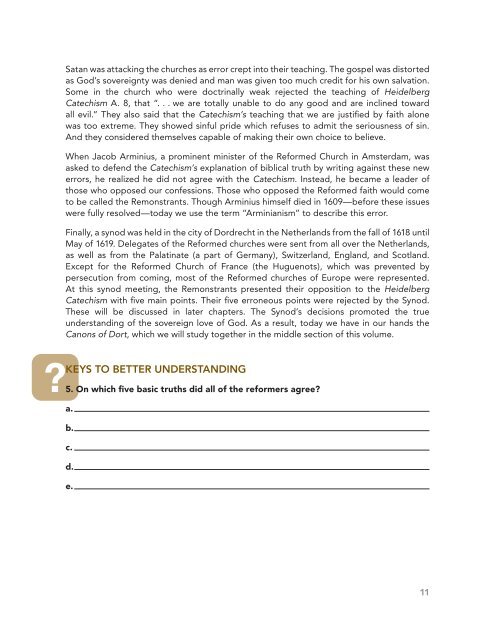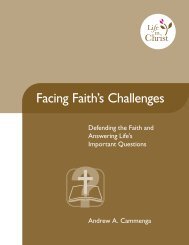The Doctrines of Grace - Reformed Fellowship
The Doctrines of Grace - Reformed Fellowship
The Doctrines of Grace - Reformed Fellowship
Create successful ePaper yourself
Turn your PDF publications into a flip-book with our unique Google optimized e-Paper software.
Satan was attacking the churches as error crept into their teaching. <strong>The</strong> gospel was distorted<br />
as God’s sovereignty was denied and man was given too much credit for his own salvation.<br />
Some in the church who were doctrinally weak rejected the teaching <strong>of</strong> Heidelberg<br />
Catechism A. 8, that “. . . we are totally unable to do any good and are inclined toward<br />
all evil.” <strong>The</strong>y also said that the Catechism’s teaching that we are justified by faith alone<br />
was too extreme. <strong>The</strong>y showed sinful pride which refuses to admit the seriousness <strong>of</strong> sin.<br />
And they considered themselves capable <strong>of</strong> making their own choice to believe.<br />
When Jacob Arminius, a prominent minister <strong>of</strong> the <strong>Reformed</strong> Church in Amsterdam, was<br />
asked to defend the Catechism’s explanation <strong>of</strong> biblical truth by writing against these new<br />
errors, he realized he did not agree with the Catechism. Instead, he became a leader <strong>of</strong><br />
those who opposed our confessions. Those who opposed the <strong>Reformed</strong> faith would come<br />
to be called the Remonstrants. Though Arminius himself died in 1609—before these issues<br />
were fully resolved—today we use the term “Arminianism” to describe this error.<br />
Finally, a synod was held in the city <strong>of</strong> Dordrecht in the Netherlands from the fall <strong>of</strong> 1618 until<br />
May <strong>of</strong> 1619. Delegates <strong>of</strong> the <strong>Reformed</strong> churches were sent from all over the Netherlands,<br />
as well as from the Palatinate (a part <strong>of</strong> Germany), Switzerland, England, and Scotland.<br />
Except for the <strong>Reformed</strong> Church <strong>of</strong> France (the Huguenots), which was prevented by<br />
persecution from coming, most <strong>of</strong> the <strong>Reformed</strong> churches <strong>of</strong> Europe were represented.<br />
At this synod meeting, the Remonstrants presented their opposition to the Heidelberg<br />
Catechism with five main points. <strong>The</strong>ir five erroneous points were rejected by the Synod.<br />
<strong>The</strong>se will be discussed in later chapters. <strong>The</strong> Synod’s decisions promoted the true<br />
understanding <strong>of</strong> the sovereign love <strong>of</strong> God. As a result, today we have in our hands the<br />
Canons <strong>of</strong> Dort, which we will study together in the middle section <strong>of</strong> this volume.<br />
keys To BeTTeR unDeRsTanDinG<br />
5. On which five basic truths did all <strong>of</strong> the reformers agree?<br />
a.<br />
b.<br />
c.<br />
d.<br />
e.<br />
11



